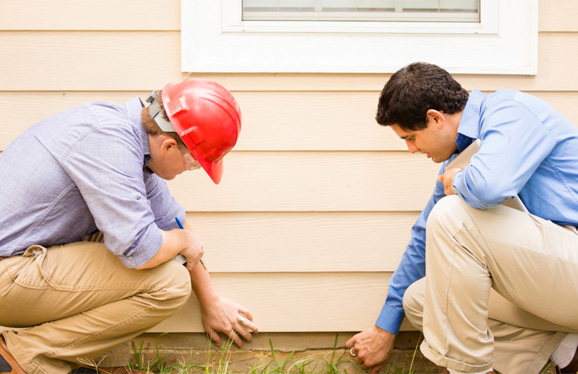Aerotek Environmental, LLC offers free seminars for Real Estate offices. Learn what every real estate agent should know about mold and how it affects the buying and selling of a home. We cover testing, remediation, results interpretation, and most importantly, what to do as an agent dealing with a listing involving mold.
Don't let mold break your real estate deals because of misinformation or alarmist mold companies or home inspectors. Our knowledgeable inspectors have degrees in science and years of experience and training in mold inspection and remediation. We can help guide you and help separate fact from fiction when it comes to mold.

Disclose Everything
Failure to disclose - intentional or otherwise - is perhaps the most common problem that sellers encounter. Maintain a comprehensive list of all repairs, major or minor. Pay particular attention to issues involving water damage, even seemingly small problems. If areas such as wall cavities need to be inspected, prepare to do so long before you list the property. If you are in doubt as to whether you should disclose small concerns, do not hesitate: disclose everything, and do not conceal anything.
Make All Necessary Repairs
Before you list the property, take prudent steps to repair all damage related to water intrusion and mold contamination. Now is not the time to cover up mold growth with bucket after bucket of paint. If you suspect a mold problem, hire a professional to investigate. If a major mold problem is discovered, involve that professional at an early stage to avoid the risk of cross-contaminating other areas of your home. Remember, a modest expense now can save thousands on the sale of your home or in litigation costs in the future.
Document
One of the advantages of paying the added expense of a Certified Mold Testing and Inspection company is that you now have sound documentation for future disclosure. You can demonstrate with confidence that you have taken the steps necessary to identify and repair all known concerns. Be sure your Certified Mold Remediation contractor provides a detailed account of all work performed and all important dates.
Educate and Cooperate
Awareness of your rights and liabilities as a seller will enable you to respect buyers' concerns without giving into their every whim. If there is a justifiable reason to suspect microbial contamination, consult with experts to determine your options, and work with buyers to resolve the issue. In the meantime, maintain a positive and constructive dialogue between yourself and the prospective buyers (or your respective real estate agents).
Be Willing to Assume Partial Costs
If legitimate unabated concerns exist, agree to either repair the problem before the sale or assume partial cost for future repairs. Be sure to set limits. Signing a blank check is an invitation to financial disaster, especially in litigation matters involving personal injury. The same holds true for areas that you know have been repaired but demonstrate residual levels of contamination upon post remediation testing. It may be impossible to determine with 100% certainty whether the contamination was removed, so if a chance exists, agree to a fair amount for future testing (and repairs, should the problem resurface). Clearly, you will want an attorney to review all agreements prior to signing on the dotted line.
Perform a Mold Inspection Prior to Listing
The proactive seller will already have the results of a mold inspection in hand prior to listing. We recommend this only if the property has sustained prior water damage or mold contamination. Your proactive stance will be viewed as a good-faith gesture. Be sure to follow through by giving buyers the opportunity to contact the consultant directly.

Disclose
Demand full disclosure of concerns such as prior water damage, structural repairs, and the assessment or remediation of any mold-related problems. Although disclosure of water damage is the law in most states, a surprising number of states still do not require full disclosure. Disclosure laws for mold are only starting to emerge.
Inspection
Conduct a general home inspection prior to closing. You might be amazed to learn just how many home buyers waive this option, especially in competitive "seller's markets." But regardless of the market, every buyer should seek a home inspection to avoid potentially catastrophic losses. Although a general home inspector is not an expert in microbial contamination, they will likely identify the most obvious signs of prior water damage, common cover-up tactics, and even suspected mold growth.
Hire an Expert
If you are still uncertain but you don't want to walk away from your dream home, demand that a more thorough inspection be performed by a Certified Mold Testing and Inspection company. At this stage, many buyers and sellers will part ways due to the perceived hassles of further investigation. Still, a number of sellers are willing to allow whatever is necessary to complete the deal, but of course the cost is typically assumed by the prospective buyer. A visual inspection and sampling by a mold specialist can identify signs that a general inspector may miss. The microbial expert can also assess the likelihood of mold growth pertaining to prior water damage. If necessary, samples are also collected to determine the identity of suspected material.
Work with the Seller
If the seller discloses the existence of a prior mold problem, ask to review all relevant information such as investigative reports and remediation plans. The seller should be able to demonstrate that the problem was properly remediated. If you are in doubt, consult with a specialist to review these documents. You should also ask permission to speak with the consultant involved in the original investigation. Many sellers will work cooperatively to help you assess the current risks. If you have gotten to this stage, it is usually a sign that sellers have done everything in their power to be cooperative, honest, and pragmatic, so work with them. In many cases they may also be willing to assume part of the financial burden should future contamination emerge from suspected areas.
"As-Is"
Purchasing a home on an "as-is" basis is extremely risky, especially in today's world of mold lawsuits. Remember, once your name is associated with the home, you become wholly or partially responsible for all subsequent repairs - even well after you have resold the home.
More on Mold Inspections
Mold inspections for real estate transactions differ from the "typical" mold investigation, namely because the seller rarely agrees to invasive inspections of wall or ceiling cavities. Still, a few protocols can be performed with minimal damage to the existing infrastructure, including visual assessment of all accessible areas, photographic documentation, moisture assessments, sampling, and review of disclosure statements, maintenance records, and prior abatement or inspection protocols. The cost of performing a mold inspection will depend on the expertise involved and the type of work performed. But depending on the location, you can expect to pay between $500 and $1,200 for a mold inspection by a qualified expert.
Prevention
Tenants can take a number of steps to prevent the accumulation or intrusion of excess amounts of moisture. Improve air circulation and reduce moisture levels in the air by opening windows and running fans, including bathroom and kitchen fans. Leave some space between furniture and walls to allow any moisture to escape. Promptly dry any minor water spills, and clean up small amounts of mold in the rental unit.
Notification
Tenants should promptly notify landlords or property managers when they find evidence of moisture problems or mold growth that they are unable to correct themselves. Contact the property manager if more than a couple cups of water are spilled, or if you are unsure of the extent of a water spill. Notify the property manager as soon as possible if you suspect a pipe leak or water entering through a wall, as the problem may be much larger than it seems. Keep in mind that repairs costing more than a few hundred dollars may require a building permit. Talk to the landlord before undertaking such a project.
Documentation
Verbal communication should be followed up in writing, both to avoid misunderstandings and in case such documentation is needed in any future legal proceedings. Most landlords and property managers are eager to learn about and correct moisture and mold problems, since the longer the problems continue, the more severe and costly the damage may become.
 |
 |
 |
|---|
 |
 |
 |
 |
 |
 |
 |
|---|










